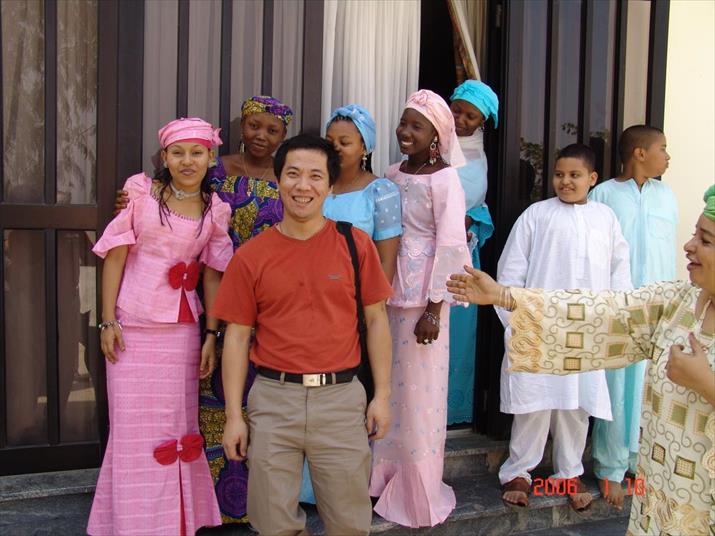|
||||||||||
| Home Nation World Business Opinion Lifestyle ChinAfrica Multimedia Columnists Documents Special Reports |
|
||||||||||
| Home Nation World Business Opinion Lifestyle ChinAfrica Multimedia Columnists Documents Special Reports |
| Africa |
| From Stranger to Admirer |
| A Chinese agronomist's three-year stint in Nigeria taught him how to go from "culture shock" to "culture appreciation" |
| By Li Xiaoyu | VOL.9 September 2017 ·2017-09-06 |

Unlike most Chinese agronomists working in Africa, 41-year-old aquaculture expert Wang Dajun, who goes by the pen name Bo Wen, did not confine himself to purely technical matters on his mission to Nigeria.
In his recently published book, The Thousand and One Nights in Africa, a collection of excerpts from his diary written during his stay in the country in 2004-07, he details his many encounters with local people.
In fact, by observing and communicating with the local people, Bo was able to go beyond stereotypes about Africa and made up his own mind about Nigeria, eventually falling in love with Nigerian culture.
But such understanding did not come easily. In such a distant and culturally different country, he also experienced culture shock during the initial days of his mission.
Ability to adapt
In March 2004, Bo came to Nigeria's Bauchi State as part of the South-South Cooperation Program of the United Nations Food and Agriculture Organization (FAO). But frankly, he said, the first days were hard on him.
During the first month of the mission, Chinese experts stayed in a hotel. It was during this period that Bo discovered a unique culture.
As the days are long and scorching hot in Bauchi, many local people spend hours sitting and chatting in the shade under mango trees. While Bo was silent and reserved at first, his curiosity eventually led him to take part in their conversations. This step enabled him to exchange with local people and allowed him to gradually "acclimatize" to local life.
"Cultures in Nigeria and China are quite different. But rather than complaining, it is better to change our own ways while communicating with local people, and get along with them in their ways," he said. He noted that guided by this attitude, he found it's quite easy to communicate with local people. "Getting along well with local people was a great help in my work in the country," he added.
In addition, he also advised his Chinese colleagues that they have to adapt their mindset. "Since we were working in Nigeria, we must get used to local ways of doing things," he said, adding that this attitude made him feel much more comfortable working with his Nigerian colleagues.
From understanding to admiration
During his free time, Bo used to write down his career experiences and anecdotes in a diary, which he e-mailed to his family and friends once a week. Little by little, after three years, he managed to write more than 800,000 words.
Keeping his diary encouraged him to further explore his knowledge of local customs. Although his mission was limited to the State of Bauchi, he decided to travel around the country in his free time. During the three years, he visited 31 of the 36 states in Nigeria.
In the street, he often saw Nigerian women carrying baskets on their head. Though this practice may seem unusual to some, Bo found wisdom in the custom: their baskets not only sheltered them from the harsh tropical sunlight, but also freed their hands, while walking to their destination.
"This practice has existed for a long time, so it must have its purpose," said Bo, who always seeks to understand the local way of life by recognizing its merits.
Sometimes, he saw people who are not familiar with each other, exchange greetings for long periods of time. This is in stark contrast with the Chinese, who are rather reserved when meeting unfamiliar people.
This style of greeting seemed to him a little bizarre at first; however he soon became accustomed to it. Now, having returned to China, he has kept this habit and often greets complete strangers in the street. "It's such a simple gesture, but it's very human, isn't it?" he said with a smile.
But what touched him the most is the boundless optimism and enthusiasm of Nigerian people. Even if some of them can only afford to eat one meal a day, he said, as soon as they hear music, they begin to sing and dance with contagious energy and laughter, leaving all their financial worries behind them.
"They prefer for things to stay simple in life. It is also the source of their happiness," said Bo.
Beyond stereotypes
Ten years after his return to China, Bo still has a vivid memory of his stint in Nigeria. He misses evenings under the starry sky and fireflies lighting up the grass, so much he dreams with all his heart to return to Africa someday.
But time is lacking, and he can only read his diary from time to time to reconnect with his past experiences. Over the years, an idea took ahold of him: the need to share his stories with a wider public, so he wrote and published his book.
"I want to make readers aware of the real Africa, which is multicultural and ravishing," he said.
In addition to Bo's realized dream to publish a book about his time in Africa is his wish to produce a film about the continent; a film about "their true way of life." Such a project would help break the stereotypes that are usually found in most films about Africa.
"Instead of recurring themes like war, disease and poverty, we should spread a more positive message, and let viewers see Africa as it is," said Bo, who has already written a scenario based on his experience in Nigeria.
| About Us | Contact Us | Advertise with Us | Subscribe |
| Copyright Beijing Review All rights reserved 京ICP备08005356号-5 京公网安备110102005860号 |